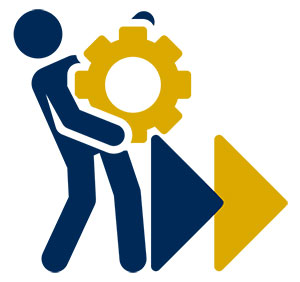As we seek to find our new way of working and what that means for us as individuals, it is also important to be thinking about what it means for our teams and who we collaborate with. This post is geared for supervisors and managers who may be tasked with setting new expectations with their teams. However, even if you are not a supervisor or manager, this post may give you some insight to how to ask questions and advocate for your team as we work forward.
If you didn’t read last week’s post, which set the stage for this post and future posts in this series, I encourage you to check it out here .
Let’s get into three tips for managers and supervisors.
Tip No. 1: Set clear and transparent expectations with your team
 Setting expectations with your team should always be a priority and it should jump up your to-do list with the inevitable modifications to business as usual coming over the next six months. Consider the following questions that should be answered by you and the team.
Setting expectations with your team should always be a priority and it should jump up your to-do list with the inevitable modifications to business as usual coming over the next six months. Consider the following questions that should be answered by you and the team.
- How do we collaborate to support business needs with the different schedules in the office?
- What are our primary communication channels?
- What does professional and respectful communication look like for our team?
- How do we handle challenges and conflicts?
Expectations like these are important to have outlined and clarified to promote smooth team collaboration and communication, especially as our operations will likely differ from how they were before the pandemic.. However, as we work forward, discussing expectations about work schedules also will be essential. As a manager or supervisor, it will be important to set expectations for what the work schedules will be and, when appropriate, to share the “why” about the work schedule plan. When we don’t know the reasons behind decisions, we fill in the gaps with what seems to make sense to us. This can lead to differing stories about what is happening and assumptions that may not give others the benefit of the doubt. So if you are able to share the rationale about schedules, everyone of the team can have the same understanding to why you are moving forward the way you are, thereby reducing differing narratives that could stem from a lack of understanding.
Tip No. 2: Have multiple avenues to provide input
As you move forward with your new team expectations, you may want to consider giving your team opportunities to provide feedback or input. We all need an outlet to be heard. Without one, , people will often turn to unproductive ways to communicate their feedback, such as. back channels, gossiping, undermining or disengagement from responsibilities. Consider two key factors when asking and encouraging feedback.
- Be prepared to listen and act when appropriate. Eliciting feedback and not following up will be perceived as meaningless lip service by management. After you ask for input, make sure to follow up with the individuals and team to better understand the feedback, make changes to the plan or explain why you are unable to act upon the feedback given. Always follow up.
- Give multiple avenues for feedback. You should try to have some feedback that is in a more public forum for conversation and dialogue like a town hall or open team discussion, as well as an anonymous method for feedback. This will help create conversation between you and your team, as well as allow for input to surface that may not be popular through safe and anonymous methods.
Tip No. 3: Honor anxieties and celebrate successes
As you move forward with setting expectations with your team, it is important to note it is possible that not everyone is onboard or bought into the change yet. When members of your team express anxieties or concerns about how the team is moving forward, I encourage you to see this as an opportunity to invite their perspective, which could have valuable information to help make your team’s transition to working forward smoother. Underneath concerns often lie key values or interests that need to be addressed for the team to flourish. Be curious and compassionate with everyone, even if they have a dissenting opinion. If you can figure out how to meet their needs, this is a potentially strong ally to the team moving forward. If you are not able to address their needs, at the very least you had the opportunity to address them directly rather than let unproductive communication or disengaged participation at work occur.
Additionally, look for ways to celebrate successes your team has as you move forward. When you finish a project or collaborate well with your new communication channel, highlight, commend and celebrate your accomplishments to energize forward movement. You don’t need to go into your budget to throw a party for celebrations. It can be a quick sharing or acknowledgment with an individual or team. These quick wins can help you and the team see the impact of your work and can bring energy to the good work being done.
Next week, we will have a guest interview with Talent Development Manager Kevin Reyes. He will help us walk through some of these ideas in more detail. As always, feel free to reach out if you need assistance from a private, impartial resource.
Luke Wiesner is the UC Merced Conflict Resolution Coach , a private resource for staff members who are interested in having a partner to support workplace challenges or conflicts. This service is voluntary, and you can partner with the coach by yourself or with fellow university employees.




